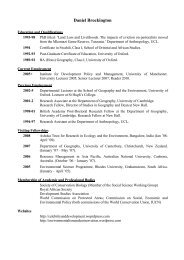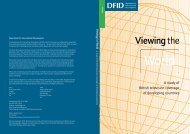The World Online How UK citizens use the internet to find out about ...
The World Online How UK citizens use the internet to find out about ...
The World Online How UK citizens use the internet to find out about ...
- No tags were found...
Create successful ePaper yourself
Turn your PDF publications into a flip-book with our unique Google optimized e-Paper software.
“If I did want <strong>to</strong> <strong>find</strong> <strong>out</strong> ab<strong>out</strong> Africaand what’s going on, I don’t thinkI’d know where <strong>to</strong> start, where <strong>to</strong>look, what <strong>to</strong> type …”Finding <strong>out</strong> ab<strong>out</strong> <strong>the</strong> developing world online<strong>The</strong> research task and <strong>the</strong> development contextRespondents were asked <strong>to</strong> think ab<strong>out</strong> anything thatinterested <strong>the</strong>m which was connected <strong>to</strong> <strong>the</strong> developing world,and <strong>to</strong> <strong>find</strong> <strong>out</strong> more ab<strong>out</strong> it online. <strong>The</strong>y were promptedwith a range of questions as examples of how broadly <strong>the</strong>ycould think, from ‘I loved Slumdog Millionaire, what o<strong>the</strong>rfilms ab<strong>out</strong> India might I like?’ <strong>to</strong> ‘how do I <strong>find</strong> <strong>out</strong> whataid workers not charity marketing people have <strong>to</strong> say?’One of <strong>the</strong> key <strong>find</strong>ings from this process is that it failed <strong>to</strong> promptmany respondents <strong>to</strong> come up with <strong>the</strong>ir own questions. <strong>The</strong> vastmajority of questions explored were ones <strong>the</strong> researchers hadsuggested. <strong>The</strong>re were very few examples of personal areas ofinterest that related <strong>to</strong> <strong>the</strong> developing world. This underlines <strong>the</strong>distant relationship between <strong>the</strong> public and <strong>the</strong> developing world.Development issues aren’t immediately of interest <strong>to</strong> most people.A minority of <strong>the</strong>se respondents were supporting developmentcharities. Most were more likely <strong>to</strong> be looking for reasons not <strong>to</strong>care than <strong>to</strong> care. <strong>The</strong>re were few points of connection with <strong>the</strong>developing world (on or offline) and all were intermittent: ComicRelief every couple of years, major disasters or charity appeals.This highlights how important it is <strong>to</strong> keep in mind <strong>the</strong> contex<strong>to</strong>f <strong>the</strong> audience relationship with development issues whenaiming <strong>to</strong> understand <strong>the</strong> role <strong>the</strong> <strong>internet</strong> could play ineducating and engaging people fur<strong>the</strong>r. Charities and NGOshave traditionally had <strong>to</strong> force <strong>the</strong>mselves on<strong>to</strong> people’s agendas,and <strong>the</strong> <strong>internet</strong> is no different a platform in this regard.Although respondents tended <strong>to</strong> choose <strong>to</strong> investigate questionsprovided by <strong>the</strong> researchers ra<strong>the</strong>r than <strong>the</strong>ir own, <strong>the</strong> choiceof questions highlighted <strong>the</strong> areas where (some) knowledge,interest or relevance existed. <strong>The</strong> most frequently asked questionsrevolved around three key <strong>the</strong>mes: aid and <strong>the</strong> percentage ofmoney that goes <strong>to</strong> <strong>the</strong> recipient compared with <strong>the</strong> amountspent on administration; corruption and which countries arecorrupt and why, and <strong>the</strong> high street and whe<strong>the</strong>r it exploits<strong>the</strong> developing <strong>the</strong> world. <strong>The</strong>se <strong>the</strong>mes were <strong>the</strong> most likely<strong>to</strong> prompt fur<strong>the</strong>r investigation or stimulate discussion.Investigations in<strong>to</strong> <strong>the</strong>se <strong>the</strong>mes tended <strong>to</strong> be conducted <strong>to</strong>support an existing point of view. <strong>The</strong>re was little sense thatpeople were looking for <strong>the</strong> ‘whole s<strong>to</strong>ry’ or information thatmight challenge existing preconceptions. Respondents generallybelieve that charities spend a lot of money on administrationand that most developing countries are corrupt. <strong>The</strong>y tended<strong>to</strong> select online information that supported <strong>the</strong>se views.<strong>The</strong> online literacy issue<strong>The</strong> process of trying <strong>to</strong> <strong>find</strong> <strong>out</strong> more ab<strong>out</strong> development issuesonline raised numerous issues concerning online literacy. Althoughrespondents, particularly younger ones, are adept at using <strong>the</strong> <strong>internet</strong>within personal spheres of interest, many were at a loss as <strong>to</strong> how<strong>to</strong> go ab<strong>out</strong> online exploration in an area <strong>the</strong>y had little experienceof and knew little ab<strong>out</strong>. This issue traversed <strong>the</strong> generations:“If I did want <strong>to</strong> <strong>find</strong> <strong>out</strong> ab<strong>out</strong> Africa and what’s goingon, I don’t think I’d know where <strong>to</strong> start, where <strong>to</strong> look,what <strong>to</strong> type …” (Young Male, aged 17-18)“I’m very poor at <strong>find</strong>ing <strong>out</strong> things. I tend <strong>to</strong> just <strong>use</strong> eBay and myemails really, so I found it quite difficult, beca<strong>use</strong> I’m not <strong>use</strong>d <strong>to</strong>looking for things on <strong>the</strong> <strong>internet</strong>” (Active Enthusiast, aged 45-65)“Where do I start?”Few people had any idea of <strong>use</strong>ful sites <strong>the</strong>y could <strong>use</strong> <strong>to</strong> <strong>find</strong>answers <strong>to</strong> <strong>the</strong>ir questions. Almost all searches started withGoogle, and this raised <strong>the</strong> issue of what <strong>to</strong> ask and how <strong>to</strong> askit. <strong>The</strong> less <strong>internet</strong> savvy typed an entire question in<strong>to</strong> Googleand <strong>the</strong>n became frustrated at having <strong>to</strong> repeat <strong>the</strong> exercise anumber of times, and often gave up before <strong>the</strong>ir question wasanswered. As one respondent recalled “I found that you have<strong>to</strong> ask <strong>the</strong> right questions. If you go for <strong>to</strong>o broad a question<strong>the</strong>n you get bombarded with irrelevant information, irrelevantsites, so you’ve got <strong>to</strong> break down <strong>the</strong> bigger picture as it werein<strong>to</strong> smaller, more precise questions” (Active Enthusiasts)Navigating <strong>the</strong> pages of links added ano<strong>the</strong>r layer of frustration.Some, often older respondents, weren’t quite sure how <strong>the</strong>hierarchy of links worked, and believed that bigger, and <strong>the</strong>reforemore trustworthy in this context, paid <strong>to</strong> be at <strong>the</strong> <strong>to</strong>p. O<strong>the</strong>rs juststarted at <strong>the</strong> <strong>to</strong>p and worked <strong>the</strong>ir way down until <strong>the</strong>y got bored.As one teenager said “I spent ab<strong>out</strong> two minutes looking and <strong>the</strong>nwhen I couldn’t <strong>find</strong> <strong>the</strong> answer I gave up” (Young Female, 15-16).<strong>The</strong> more <strong>internet</strong> savvy looked for keywords amongst <strong>the</strong> linksand accessed sites accordingly. <strong>How</strong>ever, most looked for familiarbrands that led <strong>to</strong> organisations like <strong>the</strong> BBC and Wikipedia gettingpreference over o<strong>the</strong>r (potentially more <strong>use</strong>ful) sites. “I lookedat <strong>the</strong> BBC beca<strong>use</strong> it was <strong>the</strong> first one <strong>to</strong> come in Google and Ithought it would be quite trustworthy” (Young Female, 15-16)<strong>The</strong> <strong>World</strong> <strong>Online</strong> <strong>How</strong> <strong>UK</strong> Citizens <strong>use</strong> <strong>the</strong> <strong>internet</strong> <strong>to</strong> <strong>find</strong> <strong>out</strong> ab<strong>out</strong> <strong>the</strong> wider world8





